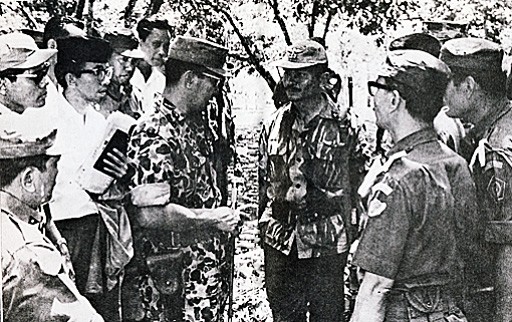Support needed for Jokowi's resolve to locate mass graves: HRW
Change Size
 Dark history -- Maj. Gen. Soeharto briefs members of the Army’s Special Forces (RPKAD, now Kopassus) prior to the removal of the bodies of the Army generals who were murdered during an alleged coup attempt on Sept. 30, 1965. (JP/30 Tahun Indonesia Merdeka/-)
Dark history -- Maj. Gen. Soeharto briefs members of the Army’s Special Forces (RPKAD, now Kopassus) prior to the removal of the bodies of the Army generals who were murdered during an alleged coup attempt on Sept. 30, 1965. (JP/30 Tahun Indonesia Merdeka/-)
P
resident Joko “Jokowi” Widodo’s efforts to start a reconciliation process around the tragedy of 1965 demands both domestic and international recognition and support, a rights activist has said.
Human Rights Watch (HRW) deputy Asia director Phelim Kine said a lack of support from senior ministers and the government bureaucracy could foil Jokowi’s plan to document mass graves from 1965.
“There are powerful elements within the government and the security forces who would prefer that the details of those victims and their killers – state security forces and the paramilitary groups under their control – remain buried and unaccounted for,” Kine said in a statement on Thursday.
Kine cited the recent statement from Coordinating Political, Legal and Security Affairs Minister Luhut Pandjaitan as an example. Luhut challenged the enormity of the massacres by stating that the death toll was “probably less” than 1,000 victims.
Luhut, Kine said, had ruled out the possibility of an official apology for the abuses and the minister had expressed skepticism about the existence of already well-documented mass graves.
As reported earlier, on April 25, Jokowi instructed Luhut to start documenting the location of mass graves across Indonesia, thought to hold more than 500,000 victims from the 1965 communist purge.
“Powerful religious groups are also opposed to accountability for the 1965/1966 killings,” Kine said.
He was referring to the Indonesia Ulema Council, the country’s highest Islamic clerical body, who cautioned that locating and excavating the mass graves would be a socially and politically divisive policy, “tantamount to awakening a sleeping tiger.”
“Elements of the government, the security forces and religious bodies have – without basis – equated moves toward justice for the victims and their families as an effort ‘to revive communism’”, Kine said.
He said Jokowi’s order was an act of political courage that defied half a century of official lies and denial.
“Establishing the location of those mass graves is the first step toward identifying the victims buried within and the circumstances of their death,” said Kine.
He further stated that Jokowi’s order posed a threat to the official narrative that had long silenced survivors and their families. “In the government’s account, the killings were a justified and heroic response to an Indonesian Communist Party plot to overthrow the government,” said Kine. (ebf)









